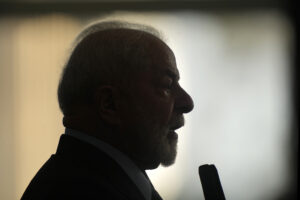The Truth Behind Musk v. Brazil
The Brazilian government’s position on social media threatens the left that brought it to power. Brazilian President Luiz Inácio Lula da Silva and Elon Musk. (Graphic by Truthdig. Images sourced via AP Photo and Adobe Stock)
Brazilian President Luiz Inácio Lula da Silva and Elon Musk. (Graphic by Truthdig. Images sourced via AP Photo and Adobe Stock)
In early October, Brazil lifted its ban on X following a prolonged battle between its government and the social media platform’s rich owner, Elon Musk. Facing fascistic threats from the extreme right, the Brazilian judiciary had demanded X remove content and suspend accounts that it deemed threatening to Brazilian society, even some cases in which the speech was protected. Musk resisted until it became clear he was fighting a losing battle and risking his company’s bottom line.
For many on the left, it was an episode in the battle for digital sovereignty, with Brazil cast as the noble Global South state, led by its left-leaning president, Luiz Inácio Lula da Silva, who put the stick in the eye of Musk, the Yankee multibillionaire imperialist seeking to impose his right-wing neocolonial agenda.
The reality is quite different.
Government moves to censor speech on internet platforms are spreading like wildfire across the world, often with support from the digital justice advocates who see a “leftist” Lula administration opposing the extreme right-wing agenda of Musk. Yet government censorship of the media — including Big Social Media — is a threat to social justice movements. It positions the state as the singular point of authority to determine what constitutes fake news and mis- or disinformation, and it is only a matter of time before the guns are turned on the left, should it forcefully challenge the state and its institutions.
That is no less the case for Lula’s Brazil as it is for authoritarian governments like Narendra Modi’s India or Recep Erdoğan’s Turkey.
Proximate origins
The clash between X and the Brazilian state began in 2019 when the Federal Supreme Court of Brazil, started an inquiry into digital militias and fake news. That included a criminal investigation into insults against the court that covered the dissemination and financing of falsehoods, as well as false accusations (denunciação caluniosa), threats and other illegal conduct affecting the honorability and security of the court, its members and their families.
Government censorship of the media is a threat to social justice movements.
The following year, a draft bill called the Brazilian Law on Freedom, Responsibility and Transparency on the Internet proposed new measures to restrict online speech. Dubbed the “Fake News Bill” by its opponents, the law sought to hold platforms liable for the spread of what was deemed fake news and require users of social media and instant messaging to post under their real names. While much of the opposition to the bill came from fascistic right-wing supporters of Jair Bolsonaro, some also came from the left.
In 2022, Alexandre de Moraes was appointed president of the Superior Electoral Tribunal, which is tasked with overseeing electoral proceedings. Already a conservative Supreme Court justice, Moraes consolidated power and expanded his censorship crusade, often through unilateral decisions that made him judge, jury and executioner in matters of online political speech.
The Fake News bill was withdrawn in 2023, but Moraes’ court took up its censorial agenda and began ordering the removal of content and social media accounts for reasons of illegal incitement, violence and alleged threats to democracy from mis- or disinformation.
Moraes’ censorship targeted content engineered to discredit the outcome of Bolsonaro’s electoral defeat in 2022, as well as attempts by Bolsonaro supporters to incite a coup against Lula, which resulted in Bolsonaro being banned from running for office for eight years. Some of the censorship included constitutionally protected speech, such as Moraes’ order to ban popular gospel singer Davi Sacer — a Bolsonaro supporter — for retweeting posts from protests against him during a trip to New York City.
And the campaign wasn’t restricted to the far right. In 2022, Moraes ordered social media platforms to remove the account of a Trotskyist political party, Workers Cause Party (PCO), for the alleged crime of criticizing the authoritarian powers of the Supreme Court. On Twitter, the PCO called Moraes a “robe-wearing skin-head” and warned, “The suppression of rights will always be turned against the workers!” PCO also called for the dissolution of the Supreme Court in favor of direct elections by the people with a revocable mandate.
In these and other cases — many of which have been kept secret — critics contend that those being censored should have the right to due process and that the government should not be left to determine truth and censor what it deems false. The Supreme Court, however, maintains that it has the power to censor legal political speech and has Moraes, a justice with a brutal record of repression, to do it.
The threat of government censorship
Prior to his appointment to the Supreme Court in 2017, Moraes served two years as secretary of public security in São Paulo under the right-wing Gov. Geraldo Alckmin. In that role, he signed orders for police to forcefully remove university student protesters demanding better education and earned the nickname, “Alckmin’s pitbull.” The two presided over a brutal crackdown on crime facilitated by a partnership with Microsoft that brought the company’s Domain Awareness System, a state-of-the-art mass surveillance apparatus used by the New York Police Department, to São Paulo. Alckmin now serves as the vice president to Lula.
Critics contend that those being censored should have the right to due process.
Lula also has a brutal record of state oppression. In 2004, he sent more than 2,000 troops to help “stabilize” a CIA-backed coup of Haitian President Jean-Bertrand Aristide. Brazilian troops led the mission and, along the way, developed brutal tactics that they took back to Brazil for policing the favelas, or poor neighborhoods. The United States provided close to $9 million to train Brazilian troops and police over the course of Lula’s presidency.
When placed in the context of the global environment, Brazil’s authoritarian censorship poses an existential threat to humanity. Even as Brazil burns from record-breaking drought and wildfires, Lula is pushing to ramp up oil production at the mouth of the Amazon river and bump Brazil from the ninth- to the fourth-largest oil exporter by the end of the decade. He is also pressing hard to pave a highway and railway through the Amazon rainforest, which is already on the verge of tipping into a dry savanna. Environmentalists warn that this project could lead to a fivefold increase in deforestation by 2030, potentially sealing the forest’s fate while speeding the planet’s warming and displacing Indigenous Brazilians.
Julian Assange warned of how ostensibly justifiable censorship can snowball in his first public speech since securing his freedom. “We must understand that when we pick a disfavored group [such as] Muslims [after Sept. 11], and say, ‘Well, this repressive legislation is only going to be used for them,’ inevitably, bureaucrats, elements of the security state, will seize upon those measures and apply them more broadly,” he said. “An injustice to one person spreads soon enough to most.”
It is reasonable to anticipate that any forceful protests against the Lula administration and state-capitalist institutions bent on ravaging the Amazon will be met with violence and repression. Should social unrest escalate, we can expect Moraes, Alckmin, Lula and their allies in the private sector to declare social and environmental justice activists a threat to democracy and widen their censorship targets to the left.
Countering ‘Big Social Media’
Musk is, indeed, a Yankee imperialist with an agenda to support the Brazilian far-right. Nevertheless, the exploitation of digital sovereignty to justify authoritarian censorship is a threat to everyone.
All political stripes, including the left, publish mis- or disinformation from time to time. (Just spend some time fact-checking your own social media feeds.) Still, the state should not intervene outside of narrow cases, such as defamation or speech that creates an immediate risk of harm to another person.
Unfortunately, many socialists, progressives and liberals are (selectively) embracing government powers to police online speech in cases they believe the government can be trusted. They view the state as a neutral or benign institution that simply needs leaders agreeable to their causes. Not surprisingly, many of them advocate for the nationalization of platforms and core infrastructure, such as cloud computing and semiconductors, as a means to counter Big Tech. For them, the sovereign in digital sovereignty refers to the government, rather than the people. This is a sorely mistaken position.
Brazil’s authoritarian censorship poses an existential threat to humanity.
As it grows increasingly polarized and the prospect of a new world war becomes palpable, the world is starting to resemble the early 20th century. But there’s a twist: the instability caused by the rapid destruction of the planet. Environmental emergency provides fertile ground for competition between authoritarian so-called socialists and right-wing fascists, each of which seek to capture the state and address the crisis with the iron fist of emergency powers.
The idea that the Lula administration, much less the Brazilian judiciary, stands for digital sovereignty is no more credible than the idea that Musk stands for free speech. Brazil embraces Big Tech — from the United States or China — so long as it benefits its own ruling class. Lula’s proposed tech legislation is essentially imported from Europe, which at best seeks to shave off a razor-thin slice of the American pie for its Silicon Valley knock-offs and, potentially, state authorities. His administration offers no principled opposition to foreign tech giants or strategy to build an ecosocialist alternative.
The tech left suffers from a lack of vision. If we want to counter the power of Big Social Media driven by the American tech empire, activists can pressure governments to decentralize social networks on socialist — rather than capitalist — grounds. This will only hold if linked to a broader agenda for system change, such as a Digital Tech Deal, which would radically democratize the digital ecosystem, in connection to other social justice movements. Free speech is essential to a free society, and can only flourish if the people seize ownership and control of the technology powering their information networks.
Your support matters…Independent journalism is under threat and overshadowed by heavily funded mainstream media.
You can help level the playing field. Become a member.
Your tax-deductible contribution keeps us digging beneath the headlines to give you thought-provoking, investigative reporting and analysis that unearths what's really happening- without compromise.
Give today to support our courageous, independent journalists.








You need to be a supporter to comment.
There are currently no responses to this article.
Be the first to respond.